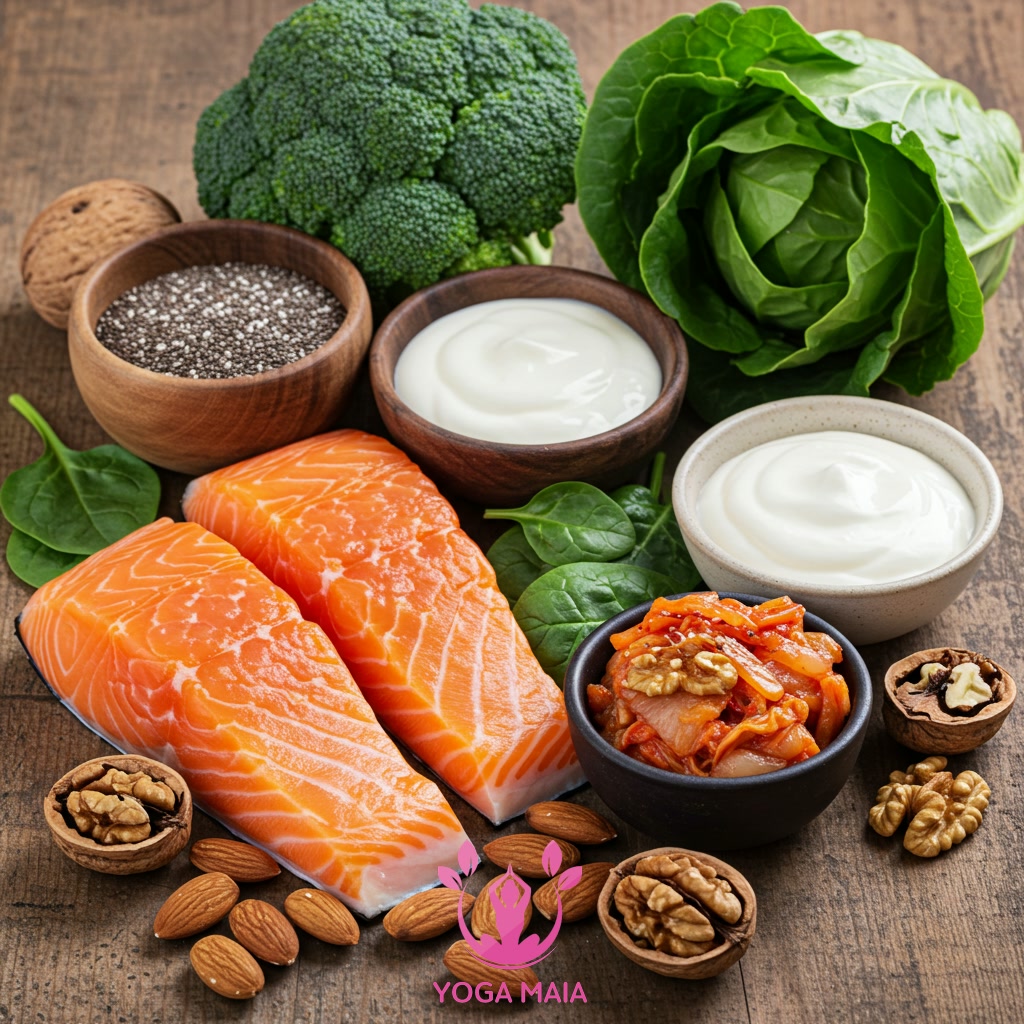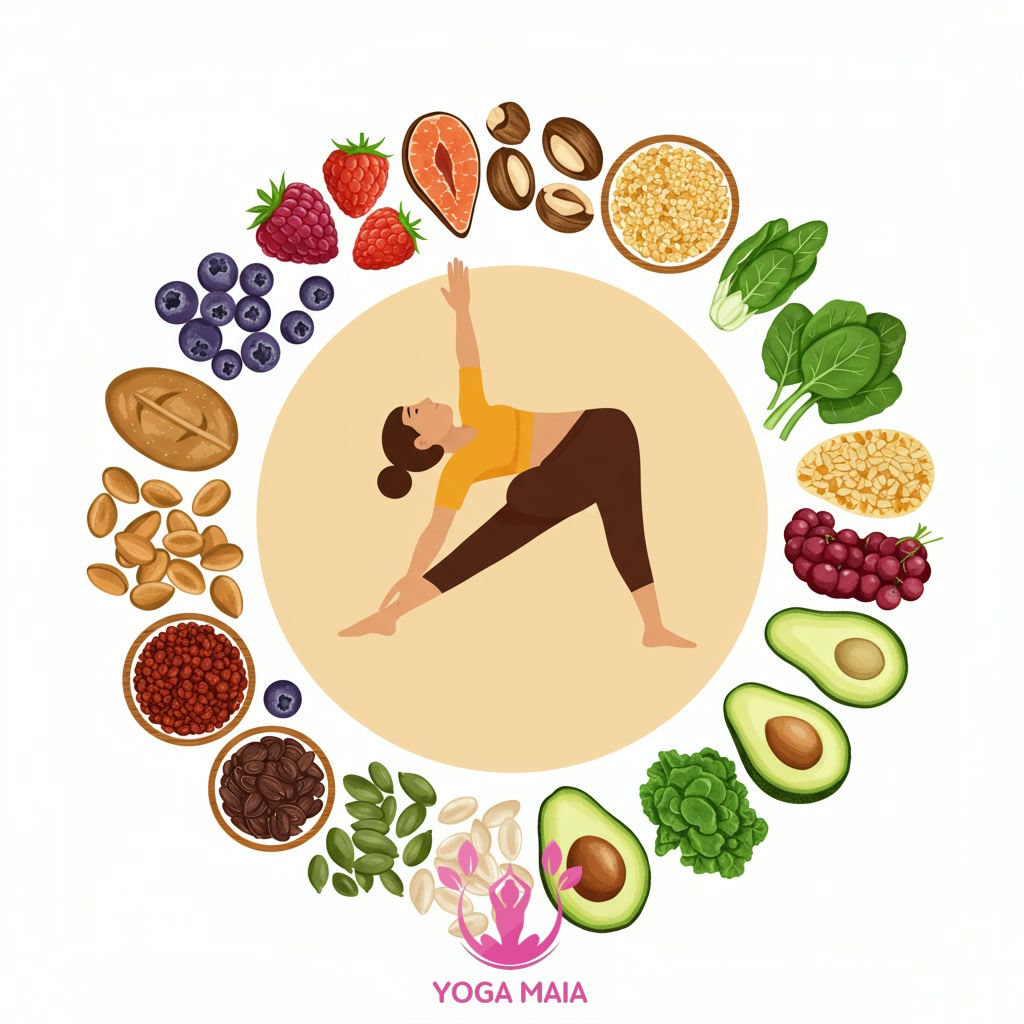Yoga Blog
Nourishing Your Mind: Foods for Calmness and Supporting Your Yoga Practice

This content explores the vital connection between nutrition and mental well-being, focusing on foods that promote calmness. It details how mindful eating can enhance your state of mind, which is particularly beneficial for supporting a consistent yoga practice. The discussion highlights dietary choices that can help cultivate inner peace and improve focus during your yoga sessions.
Table of Contents
- Section 1: The Mind-Body Connection: How Food Influences Calmness and Yoga
- Section 2: Nutrients for Tranquility: Foods That Calm the Mind
- Section 3: Fueling Your Flow: Best Foods for Energy and Flexibility in Yoga
- Section 4: Foods to Avoid Before and After Your Yoga Practice
- Section 5: Integrating Mindful Eating into Your Yoga Lifestyle
Section 1: The Mind-Body Connection: How Food Influences Calmness and Yoga
The connection between what we eat and how we feel is profound, forming a vital link in the mind-body connection. Our digestive system is intricately linked to our brain through the gut-brain axis, meaning the foods we consume directly impact our mood, energy levels, and cognitive function. A diet rich in nutrient-dense foods can help stabilize blood sugar, reduce inflammation, and support the production of neurotransmitters associated with well-being and calmness, such as serotonin. Conversely, processed foods or those high in sugar can lead to energy crashes and mood swings, disrupting inner peace. By choosing foods that promote physiological balance and reduce stress, we cultivate a calmer internal state, which is fundamentally supportive of a consistent and focused yoga practice, allowing for deeper presence and tranquility on the mat.
 The Mind-Body Connection: How Food Influences Calmness and Yoga
The Mind-Body Connection: How Food Influences Calmness and Yoga
Section 2: Nutrients for Tranquility: Foods That Calm the Mind
Building upon the understanding of the gut-brain connection, specific nutrients play a crucial role in fostering a calm state of mind. Foods rich in Omega-3 fatty acids, found in fatty fish like salmon and chia seeds, are vital for brain health and can help regulate mood. Magnesium, abundant in leafy greens, nuts, and seeds, acts as a natural relaxant, supporting nerve function and reducing anxiety. B vitamins, present in whole grains and vegetables, are essential for neurotransmitter production, including serotonin, which impacts mood and well-being. Additionally, probiotic-rich foods like yogurt and fermented vegetables contribute to a healthy gut microbiome, positively influencing the gut-brain axis and promoting mental tranquility. Incorporating these nutrient-dense foods into your diet provides the building blocks for a calmer mind, creating a more receptive internal environment for your yoga practice.
 Nutrients for Tranquility: Foods That Calm the Mind
Nutrients for Tranquility: Foods That Calm the Mind
Section 3: Fueling Your Flow: Best Foods for Energy and Flexibility in Yoga
While calming foods support mental stillness, fueling your physical body correctly is essential for an energetic and flexible yoga practice. Sustained energy for flowing sequences comes from complex carbohydrates like whole grains, quinoa, and lentils, providing slow-release glucose without the crash of simple sugars. Healthy fats from sources like avocados, nuts, and seeds offer long-lasting fuel and are crucial for joint health, supporting flexibility and mobility. Hydration is paramount; water and water-rich fruits and vegetables help maintain muscle function and prevent stiffness. Incorporating lean proteins aids muscle repair and strength, enabling you to hold poses and transition smoothly. By consciously choosing foods that nourish your body with sustained energy and support joint health, you enhance your ability to move freely and maintain focus throughout your yoga flow.
 Fueling Your Flow: Best Foods for Energy and Flexibility in Yoga
Fueling Your Flow: Best Foods for Energy and Flexibility in Yoga
Section 4: Foods to Avoid Before and After Your Yoga Practice
While focusing on nourishing foods for energy and calmness is crucial, understanding which foods can hinder your yoga practice is equally important. Consuming heavy, greasy, or overly sugary foods shortly before a session can lead to discomfort, sluggishness, or digestive issues, making it difficult to move freely or maintain focus during poses. Similarly, carbonated drinks or foods known to cause gas can create internal pressure that interferes with breathwork and abdominal engagement. Even after practice, opting for easily digestible, nutrient-dense foods helps maintain the state of calm and aids muscle recovery without burdening the digestive system. Avoiding processed snacks, excessive caffeine, or rich meals post-yoga allows your body and mind to fully integrate the benefits of your session.
 Foods to Avoid Before and After Your Yoga Practice
Foods to Avoid Before and After Your Yoga Practice
Section 5: Integrating Mindful Eating into Your Yoga Lifestyle
Moving beyond avoiding disruptive foods, integrating mindful eating is a powerful step in aligning your diet with your yoga practice. This involves paying full attention to the experience of eating – noticing the textures, smells, tastes, and the physical sensations of hunger and fullness – without judgment. By cultivating awareness around your meals, you become more attuned to how different foods affect your energy levels, mental clarity, and overall feeling, which directly impacts your ability to be present and focused on the mat. Mindful eating is not about strict rules but about building a conscious relationship with food, fostering a sense of calm and balance that complements the principles of yoga and enhances your journey towards inner peace.
 Integrating Mindful Eating into Your Yoga Lifestyle
Integrating Mindful Eating into Your Yoga Lifestyle












